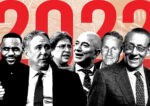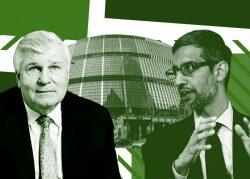A controversial contest for a casino. Unrelenting demand for luxury housing in the face of rising interest rates. A tech giant’s emergence as a potential savior of the Loop’s pandemic-battered office market. And losing the state’s richest man.
These were the topics that dominated Chicago real estate news in 2022, and will continue to drive conversation in the industry well into next year as buyers, sellers, tenants and developers contend with uncertainty amid an economy on the brink of recession.
Residential agents Jeff Lowe, Chezi Rafaeli and Susan Miner stitched together some of the priciest deals for condos in Chicago history this year, including one with a buyer who has family ties to Sterling Bay, among the city’s biggest developers. In fact, the luxury market came close to matching last year’s record volume of home sales costing $4 million or more, even as buyers negotiated big cuts from listing prices for their deals.
And despite record-high vacancy in Chicago’s office market exceeding 20 percent, one area of the city, Fulton Market, defied the impacts of the pandemic by luring a steady stream of tenants into brand new buildings with the promise their high-end amenities for employees will keep them heading into the office rather than working from home.
Still, with a turnabout of the longtime home of state government, the Thompson Center, into Google’s next Chicago hub, the Loop proved it may yet have a future commanded by office buildings, even as many of them are aged and city officials aim to revamp a substantial portion — especially on LaSalle Street — into residential assets.
While Google’s decision to buy the Thompson Center for $105 million and spend even more to upgrade it for its thousands of workers was celebrated, there was no shortage of quarrels and disappointment the city’s largest commercial players encountered, either.
No deal was more divisive than the city’s selection of Bally’s to develop Chicago’s first casino in River West on the site of the Freedom Center newspaper printing plant that produces the Chicago Tribune. The city was also dealt blows by Ken Griffin’s Citadel, Boeing, Caterpillar and Tyson Foods, all of which announced they were moving their headquarters away from Chicago.
Here’s a dive deeper inside the buzziest Chicago real estate news of 2022.
Google’s Thompson Center takeover
When longtime downtown developer Mike Reschke agreed in late 2021 to buy the dilapidated, 1.2-million-square-foot Thompson Center from Illinois’ state government for $70 million, he had to convince people he wasn’t crazy.
What company would want to rent an out-of-date, weird-looking building that requires hundreds of millions of dollars to modernize and eliminate costly heating and cooling inefficiencies?
It turned out that one of the biggest companies on the planet would. Reschke enlisted the help of an old friend, commercial real estate lender and developer Quintin Primo, to go 50-50 on buying the building and to convince Google to move in.
It only worked because the pair was able to buy a loan against the former BMO Harris Bank building at 115 South LaSalle at a 33 percent discount from the original debt held by the property’s former landlord for $120 million to take control of the distressed property the financial institution had departed. This allowed Reschke and Primo to change up the original plan for the state government to move its office workers back into the Thompson Center after it had been upgraded, and instead buy the LaSalle-facing portion of the multi-building former bank property for $75 million to use as government offices.
Farewell to Griffin, Citadel, Boeing and Caterpillar
Ken Griffin, formerly Illinois’ richest resident, left Chicago and took his company, hedge fund and securities trading firm Citadel, to south Florida.
That was one of a few losses of headquarters of major companies Chicago sustained this year. Aerospace giant Boeing, whose riverfront headquarters the company owns has been sparsely attended by workers amid the pandemic, also announced it would relocate its headquarters outside Washington, D.C., and construction equipment manufacturer Caterpillar plotted a move to suburban Dallas.
All three moves sent ripples through both residential and commercial real estate markets. Upon Griffin’s move, he launched a selloff of luxury condos in the city, listed at a combined $54.5 million, and he’s so far sold one in the Waldorf Astoria tower for a bit more than $10 million, a haircut from the listing price of $11.5 million and a loss from his purchase price.
Meanwhile, questions are swirling around the future of the Boeing building at 100 North Riverside Plaza, which had its second-largest tenant Here Technologies list 95,000 square feet for sublease a week after the aerospace company announced its headquarters move. Will Boeing decide to sell it or hold on for now?
And shortly after Caterpillar’s announcement of its Texas move, the firm put a sublease offering on the market for its 116,000-square-foot office in suburban Deerfield at the Corporate 500 complex that Opal Holdings and Prana Equities bought this year for $180 million.
Read more



Casino craze
Few political real estate decisions get windier than Bally’s beating out Curt Bailey’s Related Midwest, Scott Goodman’s Farpoint and Bob Dunn’s Landmark Development to build Chicago’s first casino.
The $1.7 billion River West proposal overcame criticism from opponents of the bid to redevelop the Tribune printing plant site who favored putting a casino at either Bailey’s The 78 near the South Loop and Chinatown, or the lakefront sites Goodman and Dunn put forward.
The city wasn’t the only venue of casino-related development news this year. Spurred by Governor J.B. Prtizker’s 2019 signing of the largest gambling expansion bill in state history, Full House Resorts is working out an agreement with the northern suburb of Waukegan to build a more than $400 million entertainment complex with 1,000 slot machines and 50 table games.
And Wind Creek Hospitality is nearing a groundbreaking on a $440 million proposal to build a 64,000-square-foot casino and potentially two hotels on the border of Chicago’s southern suburbs Homewood and East Hazel Crest. The gambling operator closed on a $25 million purchase of the land for the project from brothers Mark and Jon Weglarz, longtime Chicago-area real estate players.
Residential rush
Listing prices rarely held up as deals closed at the highest end of Chicago’s luxury market this year. Yet more deals for $4 million or more closed than in any other year except for 2021 as high-end properties withstood the broader slowdown in deals, even while rising interest rates thinned the buyer pool for the rest of the market.
Buyers, sellers and their agents nearly matched the furious, pandemic-fueled pace of last year, notching 57 sales for $4 million or more as of midway through December this year as compared to last year’s all-time-high of 66, according to the Chicago Association of Realtors.
And those included some of the priciest home sales in Chicago history. In September, Mexican billionaire and CEO of Grupo México German Larrea spent $20.6 million on a 71st-floor penthouse unit in the St. Regis, one of the few at the ultra-high-end of the market to sell over asking price, which was $18 million.
In March, another two huge condo deals were struck. Private equity veteran Bryan Cressey and his wife, plastic surgeon Iliana Sweis, paid $20 million for a 14,260-square-foot penthouse in Trump Tower, marking the city’s third-most expensive residential sale ever.
That was followed by the $17.4 million sale of a condo at No. 9 Walton to A. Steven Crown, whose son is a managing principal of developer Sterling Bay.
And the suburbs, particularly the North Shore, weren’t to be dismissed this year. Nancy Hughes, the widow of late filmmaker John Hughes, sold a lakefront Lake Forest home for $12.9 million; southern suburban Will County recorded its first $5 million sale ever when a Homer Glen property containing a Barbie museum traded hands; and a Hinsdale mansion in the western suburbs that used to belong to the late former Molex Inc. co-CEO Frederick Krehbiel sold for $7.5 million.
The buyer of the Hinsdale property thinks the high-end residential market still has some juice left in the tank as the home was quickly relisted for $9.6 million in an attempt at a quick flip and a record price for the village.
